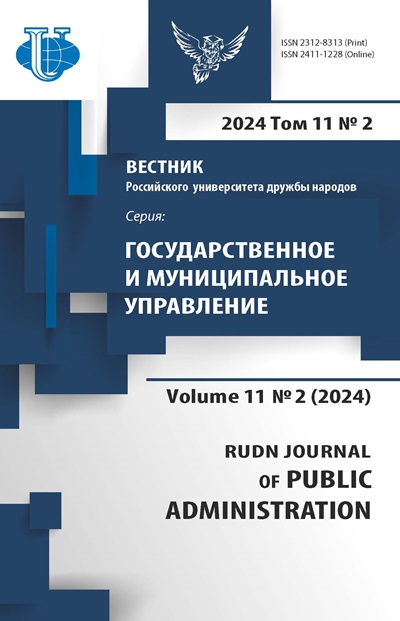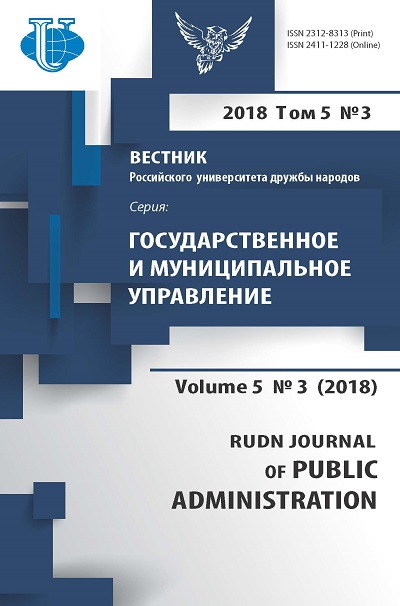Vol 5, No 3 (2018)
- Year: 2018
- Articles: 9
- URL: https://journals.rudn.ru/public-administration/issue/view/1188
- DOI: https://doi.org/10.22363/2312-8313-2018-5-3
Full Issue
MODERN TECHNOLOGIES IN PUBLIC ADMINISTRATION
Legal limitations for the use of breakthrough digital technologies in public administration
Abstract
The purpose of this study is to identify legal constraints for the digitalization and digital transformation of public administration, based on the introduction and application of breakthrough digital technologies. The research methodology is based on the distinction between the stages of informatization, digitalization and digital transformation, as well as the identification of legal barriers to digitalization and digital transformation of public administration by individual stages of the management cycle and individual public functions. As a result of the analysis, both general barriers to digitalization and digital transformation of public administration, and special barriers for each stage of the management cycle were identified and systematized. The necessity of eliminating the identified legal barriers to the digitalization and digital transformation of the public administration has been substantiated by introducing a set of changes in federal legislation and sub-legal regulatory legal acts.
 235-247
235-247


Modern technologies for the provision of governmental social services in the Moscow region
Abstract
The relevance of this article is due to the great demand for various government services, the leading position among which is occupied by the positions of the Pension Fund of the Russian Federation, as well as of the Social Security Authorities. In this regard, the current government seeks to facilitate this process by creating multifunctional centers for the provision of public services, as well as federal and regional portals of public services that allow people to interact with authorities without leaving their homes.
 248-255
248-255


CIVIL SOCIETY AND PUBLIC ADMINISTRATION
New public service based on citizen centric on Malang licensing services in era of decentralization
Abstract
An important point in good governance is Essentially the provision of excellent service to people who have citizenship rights that must be provided by the government. Globalization has encouraged the paradigm changes in government in carrying out its distributive function to the community. As much as developed countries have done, public encouragement accompanied by public participation in all governance processes leads the country to a “virtual” spaces with sufficient coverage to Facilitate its citizens to Participate in all national and state affairs, the autonomy of space given to the region is Able to Make local Governments self-reliant, innovative, and creative in providing services to the community. The research conducted in the Integrated Licensing Service Agency of Malang Regency shows that the satisfaction of the society is good enough to the service product given, if it is Categorized the assessment from the public perception of the service given is A (very good). To achieve that, of course, the integrated licensing agency of Malang regency through a long way to reach it starting from building a mutual commitment to change the more autonomous institution in carrying out the service function to the society.
 256-271
256-271


The role and functions of civil control in the formation of an effective communicative discourse of public administration
Abstract
The article is devoted to the actual problem of optimizing the model of interaction between government bodies and civil society institutions in the context of the institutional development of government. The author focuses on the essence, the role and functions of civilian control in improving the efficiency and effectiveness of government.
 272-284
272-284


CIVIL SERVICE MANAGEMENT
Competitiveness of public service in conditions of social changes
Abstract
The article deals with the development of the civil service and ensuring its competitiveness in a changing social environment, based on an analysis of the components of competitiveness, suggested ways to increase its prestige and focus on achieving a socially significant result.
 285-294
285-294


Motivation of civil servants: the need for a systematic approach
Abstract
In this article the questions of motivation are considered through the prism of motivation management on the basis of understanding the specifics of the state of motivational and need sphere of civil servants. The results of the analysis of the features of labor motivation during the personnel audit in the regional authorities of one of the subjects of the Russian Federation, which confirms the thesis of the need to distinguish motivation from satisfaction. The paper presents an analysis of studies of domestic and foreign authors on the specifics of the motivation of civil servants. It is concluded that most of the studies contain recommendations aimed at improving the satisfaction of employees, rather than improving the efficiency and effectiveness of their activities. Based on the analysis, the main elements of the system of incentives for civil servants were developed.
 295-304
295-304


CURRENT PROBLEMS OF PUBLIC ADMINISTRATION
Modern organizational structures, and the possibility of their adaptation in the field of public administration
Abstract
The article is devoted to the review of modern types of organizational structures through the prism of their practical application by both commercial structures and public administration bodies. Modern types of organizational structures provide great opportunities to achieve the goals of different levels. In general, the trend of development of organizational structures is reduced to the predominance of a set of highly organized teams on the principle of horizontal management as opposed to the hierarchy of mechanistic organizational structures. The author emphasizes that there is no single correct, the most ideal type of organizational structure suitable for all organizations, regardless of production or service technology, organizational and legal form, strategy and operating conditions. First of all, for modern organizations it is important to adapt to the changing factors of the environment and the choice of the optimal organizational structure, taking into account the specifics of the activity. The requirements of the citizens to the quality of services and management functions are changing, the requirements of the world community to the implementation of public administration are also constantly growing - all this makes changes in the structure of public administration. This article attempts to explore the possibility of adapting new types of structures in the field of public administration, which is committed to the concept of Good Governance.
 305-317
305-317


Analysis of the Russian experience in reforming control and supervisory activities (part 2)
Abstract
The modern period of reform of control and Supervisory activities is full of events, novelties of norm-setting, social experiments. In recent years, the main vector of reforms is aimed at respecting the interests of controlled objects in the preparation and conduct of control and Supervisory activities, the introduction of risk-based control, allowing to concentrate resources for control and supervision in those areas where there is a high probability of violation of the values protected by law. The article considers the dynamics and the main results of the reform of control and Supervisory activities. Among the positive results of the reform are the pilot implementation of a risk-based approach in control and supervisory activities, a system for evaluating the effectiveness and efficiency of control and supervisory activities. Some positive dynamics emerged in the application of checklists. From the point of view of the author, insufficient attention is paid to questions of a critical analysis of the need and sufficiency of control and supervisory activities in terms of the protection of legally protected values; the possibility of replacing state control and supervision by other, including non-state institutions. The author substantiates the conclusion about the analysis of the need for control (supervision), systematization of control and Supervisory functions and audit of mandatory requirements before making and implementing decisions related to the technological aspects of control (supervision). Also, proposals are made to adjust the provisions contained in the draft law “on state and municipal control (supervision) in the Russian Federation”.
 318-342
318-342


Social innovation and management: cross-national determinants and aggregate variables
Abstract
Numerous studies have examined on a micro and macro level factors that influence innovation at the individual, agency, or business level. Yet there is little research on cross-national variables associated with innovation at the nation-state scale. Drawing upon existing databases, this paper examines the factors associated with some countries being labeled as more or less innovative, suggesting policies that might be enacted to promote social innovation and management. It finds that national innovation rankings are modestly correlated with democratic freedoms, control of corruption, regulatory quality, and percentage of the population with tertiary education. However when a multifactor test is performed, these factors provide significant evidence of cross-national and aggregate determinants associated with innovation.
 343-358
343-358
















